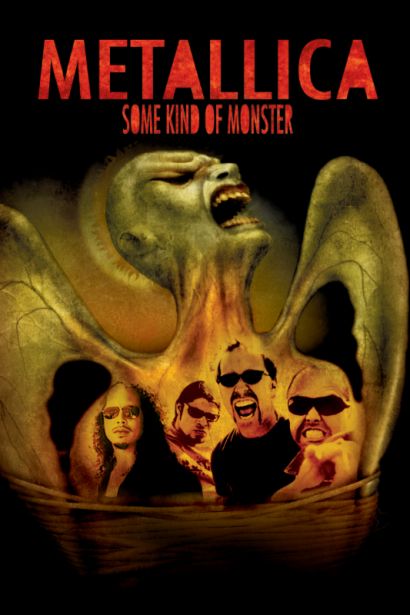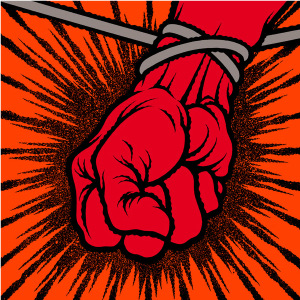I thought this would be a good time to write about Metallica’s highly controversial documentary Some Kind of Monster for two reasons. One, I recently published my take on the band’s newest studio album Hardwired… To Self-Destruct and it would be good to connect some dots here. But also, I’ve only just seen the film, so the memory is fresh. I’ll write my conclusion right at the beginning: I think this documentary is an amazing insight into what a group of people may go through when the pressure they’ve felt for a long time is not dealt with. Regardless of whether you’re a metal fan or not, you should see it.
We all know Metallica, right? There’s many impressive statistics you can find about them online – but a quick summary of who they are is that they are the biggest heavy metal band in the world. And I don’t necessarily mean from a sales perspective. Metallica is also the biggest metal band in terms of sheer popularity. You may not know a single song of theirs, but you will have heard of the name. You can’t really say that about a lot of bands, let alone a metal band. On a personal note, they are one of my favorite bands. I like most of their studio records and thought 2008’s Death Magnetic was one of their best. And even though I don’t always agree with them on the creative directions they take, I always respect their courage to engage in endeavors that very few rock/metal bands would ever go for.
Having said that, I didn’t see this documentary for a long time. At first, I wasn’t interested. Heavy metal sites didn’t give it good reviews at the time and I didn’t like St. Anger, the band’s 2003 album that came out around the same time as the documentary. I thought the film was going to be about St. Anger, with some drama thrown in. After a few years passed, I did get more interested in the documentary but never really got around to watching it. I’d gotten over my prejudice and actually wanted to watch it, just never really did it. And then it hit Netflix… You can’t really make up excuses anymore once something is on Netflix, can you? Especially if it’s something you’ve been meaning to see for a long time! So, I sat down and genuinely got excited about finally seeing what all the buzz was about.
If you haven’t seen it, or if you saw it a long time ago, let’s rewind the clock for a bit. You can’t fully comprehend Some Kind of Monster by today’s Metallica – it was a considerably different time for the band between 2001 and 2003. And you don’t appreciate just how different until you see the documentary. Metallica did two controversial albums in the late ‘90s, Load and ReLoad. They are a lot less controversial today because fans have grown to like them; but I became a fan of metal in the late ‘90s and I remember some of the reviews at the time – the accusations that Metallica “sold out” or “lost their identity” were abundant. You can shield yourself as much as you want from all that, but it’s likely going to get to you! Furthermore, they were wealthy musicians with every ingredient available for them to have big egos. I mean, you release one chart-topping album after another. You sell out stadiums. People know who you are all around the globe. How do you keep your ego checked? This was the state of affairs going into 2001, the year the documentary started.
There were also three major events that either happened right before shooting of the documentary began or were happening while the recording was ongoing.
One was the departure of long-time bass player Jason Newsted. He mainly cited health reasons in his official statement, saying he needed to recover from years of headbanging. But the real reasons, some of which is also documented in the film, came out later. Since James and Lars determined the creative direction of Metallica most of the time, Jason needed another creative outlet so he formed Echobrain as his side-project. James Hetfield got “territorial”, as Jason puts it, and did not approve; despite Jason pointing out that his side-project would not affect Metallica at all. Just when Metallica’s management was getting ready to support Echobrain, Hetfield put a stop to that. For Jason, that meant he could no longer stay in the band.
(Note: I get the sense that this is water under the bridge at this point. Jason played a few songs with Metallica in 2011 as part of their 30th anniversary and said in a few interviews that he was on speaking terms. I think James also regrets the whole situation with Echobrain and is now less defensive about where Metallica should be in everybody’s lives.)

Jason Newsted (L) performs with Metallica’s current bass player Robert Trujillo during the band’s 30th anniversary shows in 2011
There were other crucial developments in the Metallica camp that end up taking a major stage in this documentary. James Hetfield was battling alcohol addiction and had to check in to rehab during the shooting of the film. You can see at the beginning that he’s not in such great shape. There’s even one point where he talks about going to Russia for a camping and hunting trip, and he mentions how they were drinking vodka like water. You start seeing what the addiction is doing to him. There were other battles he faced (like different creative approaches) – but his battle with alcohol addiction was definitely the most serious one. When he goes for rehab, Lars at some point says that he’s not even sure if James would ever be back in Metallica. Imagine that! Things were that fragile for a little bit. Obviously, he’s back and stronger than ever; but it took him a while to figure all this out.
On the Lars Ulrich front, you had the Napster battle. Remember that? I think he’s fully vindicated by now because he’s proven himself repeatedly. But back in 2001? Oh no – the public opinion was so different. People were breaking Metallica CDs in protest and Lars took a lot of heat as he was accused of being “greedy”. All Lars was arguing for was that the bands themselves should choose how and when their music would be distributed. No one else should be able to make that decision. Of course, he was right about that! If you created something, and you found out that people were “sharing” it without your permission, how exactly would you feel? We all see this clearly now – but back then, Lars was fighting a tough battle. Even the artists who would agree with him off the record never really supported him publicly. He entered the studio while all this was going on.
Now, right around this time the band’s management decides – and convinces the band to – bring in Phil Towle, a performance-enhancing coach, to help the group come to terms with their personal differences. He sort of comes across as a “villain” to many metal fans; as someone who “ruined” a metal band’s image by making them look too “soft” because he pushed them to confront their emotions. A metal band talking to a therapist? Even the band had a hard time with it. If you watch the documentary, their attitude towards Phil changes throughout the years (the documentary covers a timeframe between 2001 and 2003). They are willing to engage in these therapy sessions at first, but there’s real resistance to his presence towards the end. In fact, 10 years after Some Kind of Monster was released, the guys in Metallica released a new video to reflect on it. There, the guys themselves admit that they were kind of harsh to Phil at times and he did come across as the “villain” likely because of that. But no matter how you look at it, the documentary has a very important character in Phil and the discussions he facilitates end up being extremely critical for the future of the group.

Metallica and Phil Towle (second from left), with the newest addition to the band Robert Trujillo (far left)
The reason why we have a documentary in the first place is because the band thought it would be cool to get a film crew to document the preparation of what would be their 8th studio album. For all intents and purposes, this was intended as a film about the recording of the album. But as we know now, it ended up being so much more…
It’s hard to summarize a film with so many ups and downs. So, I won’t attempt it. I’m just going to focus on my reflections. Like I said earlier, I had a lot of prejudices against this documentary at first but when I finished it I had a lot of respect for the band for going through with it. It has got nothing to do with St. Anger, because I still don’t think it’s a good album. I tried to get into it…but, nope. I do, however, understand why it had to happen and I have a lot of respect for Metallica for having the guts to confront their emotions the way they did. It was a shitty time for them but those times led to a healthier future and they’re still here!
It’s always difficult when you feel vulnerable. But it’s more difficult if others in your group are vulnerable too. Just like you. And this group happens to be a metal group – a genre whose fans don’t really treat artists who show emotion well. “You are a metal icon, you’re the guy that drinks a lot, swears a lot, headbangs a lot – how can you be sensitive?” “What? We didn’t ask for that! Give us the song with the fast drums.” “I don’t want to see this therapy shit…” Obviously not everyone is like that; but the fact is there’s a certain image that came with being a metal band. We see much less of that today as the metal music landscape is so different; but for the metal artists that started in the ‘80s, protecting this “tough guy” image was almost a necessity to keep their reputation intact.
And to be honest, it’s not always the fans criticizing bands with every change. Sometimes it’s also the fact that musicians feel this pressure because they are afraid any creative output that gets deemed “different” may hurt their reputation. They may lose everything if crowds don’t react well – even if they haven’t even reacted to anything yet. Naturally, the questions are abundant. Is what you’re doing now something the fans might reject? Is it okay if they do? Should you still go for it? Are you abandoning who you really are? Are you betraying your roots? There’s so many questions and this film shows quite clearly that Metallica felt all this pressure, if not more.
In a 2016 interview with Rolling Stone, Lars Ulrich said that he learned how to “compartmentalize stuff” when it comes to watching Some Kind of Monster. He said he could almost see himself as a “third person”. It’s apparent that the reason is because the whole episode is still too painful. There were many scenes where he and James clashed big time. There’s that one scene where Lars talks about how frequently James utters the word “fuck” and complains. And at one point, Lars can’t help it and he gets his face as close to James as he possibly can, and just screams “fuck!”. It’s an outburst of extreme aggravation. There are other times where after the duo clashes, Hetfield exits the room and slams the door in a sheer display of frustration. This is why it’s painful! These guys are friends. At that point, they’d known each other for 20 years! When you watch the film, you realize it is as much about two close friends who have never really talked about their feelings as it is about a musical group’s creative journey. Their personal relationship was put to a serious test and there were cameras to film almost all of that!
[foogallery id=”772″]
There are so many pivotal scenes here… There is the scene between Dave Mustaine and Lars, where Dave gets candid and talks about what he had been through because Metallica didn’t give him a second chance. Dave later asked the band not to use that scene in the film. They said Dave had already signed a release form, so legally they were able to use the footage and they did. I personally don’t think the scene makes Dave look bad – he’s being brutally honest about how his departure from Metallica affected him. But on the other hand, I think Metallica should have respected his wish to not be included in the film, no matter how legal their point was.
There is a scene where Bob Rock, Metallica’s long-time producer who also assumed bass duties on St. Anger, and Lars Ulrich talk to Kirk Hammett about potentially not having guitar solos on the album. This is where I felt so bad for Kirk. Lars and Bob first say they don’t want solos because they feel solos make a song “dated”, which is a silly argument. And Kirk calls them out on it! Kirk makes a better point saying that if you don’t have solos because that’s the trend today, that’s when you actually date a song because you’ve now followed today’s trend! So then, Bob and Lars change their tune a bit and tell Kirk that they would play by ear and only include a solo if the song calls for it. Guess what happened in the end? That’s right, there are no guitar solos on St. Anger. Not that every metal song has to have a solo; but that scene there clearly shows Bob and Lars applied a common negotiation tactic on Kirk. It was just so calculated. When they felt resistance from him (and he came with a good argument), then they made it look like they were going to “consider”, but I have a feeling they already knew what their decision was! I’m a business guy who dealt with lots of negotiations, so this felt a little too familiar… I feel you, Kirk. We’ve all been there, buddy.
There are multiple scenes where the guys question the future of the band. There’s moments where they collectively hate the mere presence of Phil Towle. There’s scenes where they hold auditions for a new bass player, and we meet Rob Trujillo in the movie! We get to see Jason Newsted reflecting a little bit about his departure, and we see Dave Mustaine having a serious moment with Lars Ulrich. There are moments where James Hetfield is clearly frustrated about writing songs together with everybody’s input, having previously assumed most of the duty. But most importantly, we see all these people off the stage. With no spotlights, no loud amplifiers, no stage decorations. They are a group of people trying to see where their ship might be headed. Their egos are big, they have different ideas about creativity, they all battle their own internal demons, and with all that going on, they are questioning what their personal and collective identities are.
Like Lars Ulrich said, “there’s nothing more important than the health of the band”. In a way, they had to go through these painful couple of years to come out stronger, and indeed, healthier. I’m glad I finally saw Some Kind of Monster. I don’t always like what they release, and I just can’t get into St. Anger. But you know what? It’s Metallica; they do things their way. I’m just glad they’re still here. Stronger than ever.
—
“Not only do I not know the answer
I don’t even know what the question is.
*
God, it feels like it only rains on me.
*
Out of my head, get ’em out of my head,
Get ’em out!
Enough’s enough.”
-Metallica, “My World” (2003)









